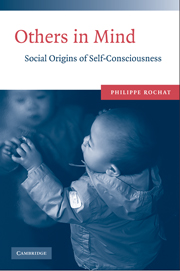Book contents
- Frontmatter
- Contents
- Foreword by Jerôme Bruner
- Preface
- Introduction: Main Ideas
- 1 Self-Conscious Species
- 2 Six Propositions
- 3 Varieties of Self-Reflective Mind State
- 4 Mind States in Development
- 5 Birth of Self-Consciousness
- 6 Shame and Self-Knowledge
- 7 The Roots of Guilt
- 8 Giving and Sharing
- 9 Origins of Owning and Sharing
- 10 Social Construction of Identity
- Conclusion: Moral Space and the Self
- Postscript Note
- References
- Index
Introduction: Main Ideas
Published online by Cambridge University Press: 05 August 2012
- Frontmatter
- Contents
- Foreword by Jerôme Bruner
- Preface
- Introduction: Main Ideas
- 1 Self-Conscious Species
- 2 Six Propositions
- 3 Varieties of Self-Reflective Mind State
- 4 Mind States in Development
- 5 Birth of Self-Consciousness
- 6 Shame and Self-Knowledge
- 7 The Roots of Guilt
- 8 Giving and Sharing
- 9 Origins of Owning and Sharing
- 10 Social Construction of Identity
- Conclusion: Moral Space and the Self
- Postscript Note
- References
- Index
Summary
Because his own nature escapes him, he tries to capture it in the eyes of others.
Jean-Paul Sartre on BaudelairePreoccupation with the self is a human propensity, becoming particularly exaggerated in recent human history. For many philosophers and historians, self-preoccupation is the sign of “modernity.” It is a syndrome associated with profound political transformations, the ratcheting effects of technological advances that transform the way we live and the way we relate to each other. This book is about this modern syndrome and how it manifests itself in human ontogeny.
As modern individuals, we promote and negotiate our own image via complex acts of self-presentation. We boast of and adorn ourselves. We excel in the promotion of desire, social envy, and seduction. We strive ultimately for our own social ascendance and inclusion by endless attempts at influencing what other people see of us, think of us, represent of us. It is an all-too-human propensity that cuts across people and cultures, hardly the special feature of shy, narcissistic, sociopathic, sexually deviant, or “needy” individuals.
As a species, we evolved a unique sophistication at self-promoting, self-deprecating, and self-spinning games. To be human, particularly in the modern era, is indeed to care about reputation. We are obsessed with the idea of what is public about us, obsessed with the representation other people might have of us, as persons, but also in relation to the group we identify with, whether family, gang, nation, or culture.
- Type
- Chapter
- Information
- Others in MindSocial Origins of Self-Consciousness, pp. 1 - 16Publisher: Cambridge University PressPrint publication year: 2009
- 1
- Cited by



